PART ONE: More memoirs coming soon…
BUT FIRST, NEW NOVELS!!! All 20% off. Order easily at our link at the end of this column.
A BookNotes a few months ago was a particular blast to do as I described some of the novels that Beth and I had been reading last summer. Thanks to those who ordered from us and thanks to those who told us what they thought. They are all still at 20% off, of course (our BookNotes offers don’t quickly expire) and, yes, the eagerly anticipated Love Songs of W.E.B. Du Bois by Honoree Fanonne Jeffers has arrived for those who pre-ordered it. We still have a stack here, now.
In that column we linked to several older lists, too, for those that wanted more unique fiction suggestions. I’m still surprised that some customers are surprised by our breadth in taste and that we suggest books that are not directly religious in nature. (Well, they all have some religious view, actually, some guiding worldview — doesn’t everyone? — but that’s another discussion.) Like a number of characters and teachings in the Bible, we believe in reading widely. Unlike many Christian bookstores, we carry New York Times best-sellers, fiction and nonfiction that is highly regarded or of interest to us. We invite you to order from us and to join us in this project, this story of which you are a part, forging a curated book buying space that is based on historic Christian faith but is open-minded and curious about the world of wonder we are called to care about. As Karen Swallow Prior taught us, Alexander Pope used to say, we “read promiscuously.” As Francis Schaeffer’s mentor Hans Rookmaaker reminded us decades ago, “art needs no justification.” Do I hear an amen? In any case, we appreciate your support and glad that our efforts somehow serve your interests in finding these sorts of interesting reads.
With the turn of a couple calendar pages, we’re in a new, brisk season of amazing new novels. Talk about eagerly anticipated: we’ve got the new Anthony Doerr (of All the Light We Cannot See fame) called Cloud Cuckoo Land. Living near Route 30 as we do, we were excited to read Amor Towles’s The Lincoln Highway. (Beth adored A Gentleman in Moscow and finished Lincoln Highway late last night. She read the last few pages twice, just to be sure.) And, oh my, we’re glad that the new one by Overstory author Richard Powers is here — simply called Bewilderment. Beth is serving as a judge in a lit prize contest so has her bookstand full, but this one is coming up soon — it was shortlisted already for the Booker Prize and the National Book Award for Fiction. (And speaking of Overstory, I wonder if the highly acclaimed Damnation Spring by Ash Davidson will live up to its reputation for inspiring ecological awe and wonder as it explores the life of a blue-collar logging family.) Speaking of prestigious award-winners: of course many are talking about the new Colson Whitehead novel, Harlem Shuffle.
Were you one of the many who enjoyed Olive Kitteridge? Elizabeth Strout’s latest installment about Lucy Baron just came a few days ago, entitled Oh William! I have reviewed Miriam Toews’s books before and her brand new Fight Night just released. We’re glad the smart Reese Witherspoon has been promoting for her book club the brand new Sankofa by Chibundu Onuzo. We’ve sold her Welcome to Lagos since it came out several years ago. So, yes, there’s a lot of brand new fiction books we’d love to see some orders for.
I’ve been sporting a little pin promoting the long-awaited Jonathan Franzen, the first in a major trilogy, called Crossroads, set among the family members of a pastor of a early 70s mainline Protestant church, First Reformed. (I chuckled right out loud when one of the pastor’s kids was looking through his father’s stuff and found magazines called The Other Side and The Witness.) There’s some graphic, uh, you-know-what, and (less expected in a contemporary novel) overt theological discussions. Something to offend everyone.
RECENT MEMOIRS – PART ONE. All 20% off. To easily order, just click on the link at the end of this BookNotes newsletter.
If our fictional suggestions were a bit wild and woolly, this BookNotes list is even more so. I like the art of memoir even more than fiction — and some memoirists are as luminous in their craft of artful writing as any novelist. And sometimes their true stories are — as we like to say — so surprising or bizarre that if a novelist made that a part of her story, some editor would say it strains credulity, with a red pencil insisting “nobody is going to believe that that would ever really happen!” I love those that are just so darn weird that it makes me gasp. What a world we live in. But I also love real-life memoirs for their subtlety and making the (sometimes) mundane meaningful, learning how other people construe their lives. Thanks to these writers who dared to tell their story. A few of these memoirs I know I will never forget.
In no particular order, here are memoirs and autobiographical works I’ve read in the past months, many quite new, a few older. All are 20% off. Enjoy!
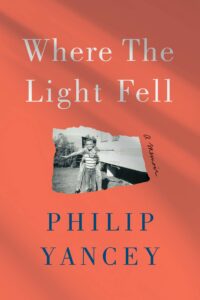 Where the Light Fell: A Memoir Philip Yancey (Convergence) $28.00 OUR SALE PRICE = $22.40
Where the Light Fell: A Memoir Philip Yancey (Convergence) $28.00 OUR SALE PRICE = $22.40
Phil Yancey is, for many of us, nearly a patron saint, an icon, a thoughtful evangelical who is widely read, smart, kind, a talented reporter and good writer, artfully exploring, often, suffering and grace and Biblical faith that isn’t pushy or dishonest about its quandaries. When he says that this brand new one is a book he was born to write, we take notice. And, wow, what a story.
I must admit that it wasn’t utterly surprising to hear of his fundamentalist background, his southern racism, his graceless mother, his doubts and struggles and hopes for a kind church that honors Jesus by showing goodness and grace to all. He has mentioned his painful upbringing and the church of “un-grace” that he experienced. Yet, having written journalistic books like Soul Survivor which tells of great, thoughtful, people of faith who inspired him and kept him going, we knew he was a kindred spirit. But, wow, I had no idea how neurotic and broken and ugly and hard his growing up years were.
Yancey has been criticized for naming the abuse and racism of his past, but he seems nearly always generous, magnanimous, sometimes, even. As some have said, this is a breathtaking work of God in his life, that as he is able to live through such toxic stuff from his past and still maintain a healthy Christian faith and life. Having finished the book with tears in my eyes, I agree — it would make sense, if he, like the brother who figures so much into this story, walks away from faith. But he does not, so there is no surprise ending here; we know that going in. But, still, what a captivating plot and what an amazing ending Where the Light Falls offers.
The comparisons to Educated and Hillbilly Elegy ring somewhat true. But as he notes (especially in conversations with his bitter, now atheistic older brother) many people were abused much worse than they were, many experienced violence of a sort that is multiple times more harsh, and some are yet resilient. His story has some harsh scenes and there is no denying the pain his family has experienced, but it isn’t as dramatic or rare as either of those two popular memoirs.
Where the Light Fell will mesmerize many who don’t understand the revivalism and sectarianism of classic American fundamentalism. They will be shocked that he attended Bob Jones, a notoriously conservative and, at the time, racist Bible college in South Carolina. It is a realistic glimpse into that part of our county’s population. But, I think, it will also ring true to many who grew up in that kind of strict, religious home. It will ring true to those who have severely ruptured family relationships, who have experienced grief and sorrow even as they’ve quested for meaning and purpose, God and redemption. It is a slow, calm, plainly spoken story for the first three-quarters of the narrative, anyway.
And then the pace quickens, the tragedy and the sorrow deepen, and the goodness of finding true faith, healthy enjoyments, a good romance, and new hope — despite all, including some signifiant new and tragic turns for brother Marshall — comes alive. I wept away tears in these last chapters as the story wove its way to contemporary times and some sort of layered resolution.
Yancey has been interviewed a number of places on line, from more conventional authors and from characters like Kate Bowler and Bob Goff. I’m glad for this as the typically demure Yancey gets to shine as he tells his real story, the story he says he was born to write. Check out some of the many reviews out there, enjoy the online interviews you might find, and come back and order the book from us, please. It is one of the very good memoirs of the year.
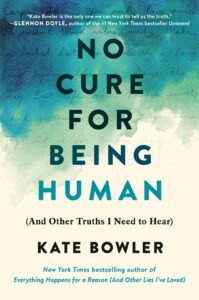 No Cure for Being Human (And Other Truths I Need to Hear) Kate Bowler (Random House) $27.00 OUR SALE PRICE = $21.60
No Cure for Being Human (And Other Truths I Need to Hear) Kate Bowler (Random House) $27.00 OUR SALE PRICE = $21.60
Well, if you know the horrible, funny, wise, questioning, upbeat, honest and very popular story of this young, Duke Divinity School prof and scholar getting what seems to be terminal cancer, Everything Happens for a Reason (And Other Lies I Loved), you most likely have already ordered the sequel, No Cure for Being Human. And if you haven’t, you really should — unless you need an absolutely strict and narrowly theologically-argued, strong view of the sovereignty of God (get Crossway’s Providence by John Piper for that angle, also written by a sufferer, but of a very different sort.) Ms.Bowler, though, is the sort that walks wearing her hospital gown, hanging on to her wheelie thingie with the IV hookups, into the hospital lobby bookstore and calls bullshit on books written by prosperity teachers such as Joel Osteen. She insists that these are not appropriate for a hospital bookstore since they offer serious dishonesty and false hopes. She knows a bit about this, actually, since, in fact, her scholarly area of research has been on the name-it-and-claim-it prosperity heresies and their impact on the religious landscape. (See her 2013 Oxford University Press book Blessed: A History of the American Prosperity Gospel.) In her colorful account of this flamboyant bit of Old Testament dramatic prophetic gesturing, she notes that she hates this false theology but can usually take it. But there, then, in the hospital with the sick and dying, she just lost it. Well played, Kate!
This new book is full of heart and joy, pain and struggle, stuff about the great relationship she has with her parents (she was born into a religious family in the Canadian prairies near Winnipeg.) There are other books by people of faith coping with cancer and illness, but few as well told and honest as this, without being overly heavy on the pathos. There are some raw books of real honesty about sickness and impending death that are snarky and sarcastic, that don’t take their plight as seriously as one might think, but many of those are either oddly self-reliant or brazenly irreligious. No Cure is not like those that are finally not terribly helpful addressing the deepest questions. Like her friend Anne Lamott, Kate Bowler has a brilliant wit and style about her that is both snide and deeply religious; full of sarcasm and candor, tender and, at times, tough. I know it sounds like a cliche but it is true: you will laugh and you will cry. There is, after all, no cure for being human.
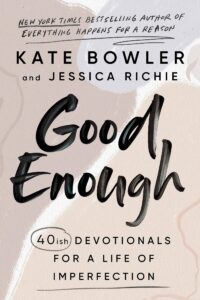 I loved this small hardback book. It has moments that are truly illuminating — about dumb doctors with terrible bedside manners, telling of unhelpful ways some people respond to news of her illness, but holding up for examination, also, the good stuff people do, decent and faithful efforts to get this stuff right. Kudos to Bowler for her work and witness, her good faith and her good writing, punchy and interesting as it is. We are very glad to be selling this book and (while we’re at it) taking pre-orders for forthcoming devotional that will come out in mid-February 2022 to be called Good Enough: 40ish Devotionals for a Life of Imperfection (Convergent Books; $20.00; our sale price = $16.00.)
I loved this small hardback book. It has moments that are truly illuminating — about dumb doctors with terrible bedside manners, telling of unhelpful ways some people respond to news of her illness, but holding up for examination, also, the good stuff people do, decent and faithful efforts to get this stuff right. Kudos to Bowler for her work and witness, her good faith and her good writing, punchy and interesting as it is. We are very glad to be selling this book and (while we’re at it) taking pre-orders for forthcoming devotional that will come out in mid-February 2022 to be called Good Enough: 40ish Devotionals for a Life of Imperfection (Convergent Books; $20.00; our sale price = $16.00.)
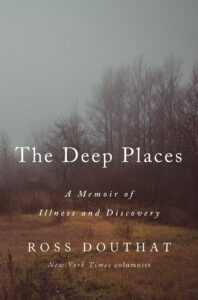 The Deep Places: A Memoir of Illness and Discovery Ross Douthat (Convergent Books) $26.00 OUR SALE PRICE = $20.80
The Deep Places: A Memoir of Illness and Discovery Ross Douthat (Convergent Books) $26.00 OUR SALE PRICE = $20.80
Well, speaking of disease and disorder, pain and the fear of dying: Ross Douthat is a very different sort of person and author than Kate Bowler and, while good humored, writes here with utter seriousness and exceptional eloquence, about a very dark few years in his life. I have reason to care deeply about his deep place, and once I started this I was struck, although not really surprised, at how it moved me, how captivating it is, and how very important (for a few different reasons) this brand new story is. It is, among other things, about his devasting experience with chronic Lyme disease.
Douthat is a deep thinker, a mature and conscientious writer, a pundit who makes his living on talk shows and confabs and by cranking out thoughtful editorial pieces as an in-house conservative voice for the New York Times. He is the sort of (Roman Catholic) conservative that, as we learn in bits and pieces in this story, opposed Donald Trump and became known in moderate, intellectual circles for insisting that the GOP find a candidate that held to classic conservative values and virtues. Be that as it may, Douthat is an author I respect (and whose last book — called The Decadent Society, which even-handedly stepped on right and left-wing toes — I favorably reviewed and recommended.) In The Deep Places he says in passing that it is nearly miraculous that he wrote that book (or accomplished much of anything) in these years of brain fog and near constant pain, some of it vicious and debilitating. This story is not for the faint of heart.
I commend this new memoir for anyone coping with the pain of illness, with chronic disorders, with bad luck or hard times. He is eloquent, religious without being weird, faithful but honest as he struggles to find hope and resilience while nearly often laid low.
For those of us who have been there, or who have had family members or loved ones who have been debilitated with whatever sort of hardships or disabilities that our frail human family often endures, this book will give voice to the many feelings and questions that arise with the struggles we face. It is not dense or an exercise in whining or even lament, although he tells of times when that was his lot. It is well written, moving without being maudlin, frank; it’s a good memoir about life, about buying a home — near Lyme, Connecticut, in a twist of fate that makes me think he was born to write this book! — starting a family, struggling with civic and neighborhood responsibilities, financial issues, career questions, extended family stuff, a little bit of faith and church life. As a story of an upper middle class white guy’s life and times, reflective and well written, it is a gem of a story. But as all hell breaks loose in his body and mind, The Deep Places quickly becomes one of the most unforgettable books I’ve ever read.
As a memoir of illness and a story of coping, it shines. For those who read this genre, you won’t want to miss it; in this sense it is both entertaining and edifying. It’s a good, good read, as good as any contemporary novel of suburban angst in the early 21st century or the harrowing experience of being sick or debilitated.
But here is what set The Deepest Place into a class unlike any other book of this kind, a book that makes it simply a must-read, one of the best books fo 2021: it both explains and explores the epidemic of Lyme disease in a more interesting manner than any other book on the topic (topping, for my money, the excellent Cure Unknown by Pamela Weintraub) and it describes with reasonable skepticism, the subculture of those struggling outside the medical mainstream for a cure for their tick-born illnesses. His self-aware foray into a desperate underground is fascinating and reliably told.
You see, the CDC and other official medical groups have declared that there is no such thing as on-going, chronic Lyme disease. That is, if you take some course of antibiotics and don’t get better, then, well, you must have something else. Most likely it is all in your head (especially if you are female) and the docs just declare there is little they can do. (One cannot get healed from a disease one does not have.) Or, perhaps, they say it is something else — we know people who were wrongly told they have MS or fibromyalgia or Crones disease because, well, Lyme or Bartonella, just goes away quickly, and if it doesn’t, you’ve got something else — something untreatable, usually. They even have a name for it, now: post-Lyme Disease Syndrome. For those who suffer with chronic Lyme it is considered dismissive, insulting, hurtful, and, frankly, not adequately scientific.
Which necessarily creates alternative medical practices and researchers and groups of folk trying all manner of wacky stuff to get better. Ross Douthart, conservative thinker and sophisticated writer, simply couldn’t imagine himself, a year earlier, ever entertaining the seemingly eccentric cures (some with significant medical and scientific evidence of some success, and others on the verge of quackery.) But there he is, going down rabbit holes into oddball treatments and conspiracy theories. How does somebody become this desperate so quickly?
And this is where the book shines. He is exquisitely aware that some of these eccentric treatments are long-shots at best. He knows he has become deeply engaged with a true sub-culture, a networked movement made up not only of reasonable health care practitioners but populated also with flat-earth conspiracy guys, social weirdos, folks dabbling in the occult, people who have maybe lost their minds. What is one to make in our secular age — yes, he reads Charles Taylor; he’s that kind of a guy — of an Enlightenment-based, rationalism that shapes a medical establishment that simply can’t see all that is there to see? What is one to make of the near spiritual overtones of some of the herbal remedies and protocols? One need not quote Shakespeare’s Horatio line to see the wisdom here. Indeed, our reductionistic metrics (and often dehumanizing practices) that inform the habits of the medical establishment — from research centers to examine rooms — need a reforming vision that is more honest, more human, more open. And The Deepest Place tells of Douthat’s first hand encounter with the way in which an unhelpful medical stonewall drove him into a whole other world, on line and in Lyme disease support groups, searching for Lyme-literate health care providers and some glimmer of hope. You will find, reading this marvelous story, whether that alt-world of Herxing and co-infections, unique protocols and supplements and Rife machines and hyperbaric chambers and IV pics and prayer and therapy really did help or not.
Almost everywhere in North America, the Lyme disease epidemic is spreading and with climate change there is no doubt that tick-borne illnesses will be more wide-spread and, most likely, more devastating. And, no, it is not conspiracy theory gullibility to report what open-minded docs are finding — the relationship between tick-born disease and mental health issues, for instance, and the way they sometimes find tick-born spirochetes in the autopsied brains of those with Alzheimers, the huge anecdata about medical practitioners ignorance about the basic facts of Lyme. (No, Lyme doesn’t always present itself with a bulls-eye rash, but if it does, it is a sure sign, regardless of the often unreliable blood tests.) This book will help you see the crisis, it will help you understand what it is like to have to live life under such pain and with such a sense of being an outcast, disrespected, a pariah, even, for not getting better as the doctors say you should.
I do not want to scare anyone away, and I’m not sure the good Mr. D would put it this way, but, on one hand, this is a moving memoir of an interesting young family with chronic pain and the hope of recovery; yes. It is also a book about Lyme disease and its fascinating history and the current state of the art of understanding it. But it is also, also, finally, a book about epistemology. That is, how does one really know anything in this crazy world? If trusted established institutions — in medicine, say — are so wrong about this, what else gives? Who is to say whether mainstream medical authorities are right or are the tens of thousands of ordinary people who have discovered otherwise?
If deep thinkers who tilt right (like Douthart himself, or his friend Rod Dreher, or scholars like Yuval Levin) warn us about the crisis of cultural authority, and if lefty postmodern critics remind us to question the truisms of institutions, wondering about their power and what they have to gain from maintaining the status quo, then the insights Douthart explores — with a light touch, since this is a memoir, telling of his thoughts and experiences, not a treatise, as such — are exceptionally important for those of us who want to forge a healthy worldview that leans into contemporary life with wisdom. In this sense, this book is an immeasurable gift, gently inspiring us to wonder: how do we know what is true? What do we trust? Why? And, that, my friends, now more than ever, is nothing short of essential. The Deepest Place is hard to read at times but it is thrilling, combining personal memoir and this hint of cultural criticism. It’s a beautifully good read, illuminating, and very, very highly recommended.
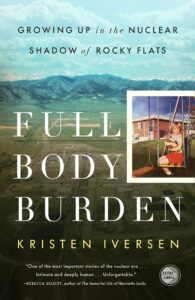 Full Body Burden: Growing Up in the Nuclear Shadow of Rocky Flats Kristen Iversen (Broadway Books) $17.00 OUR SALE PRICE = $13.60
Full Body Burden: Growing Up in the Nuclear Shadow of Rocky Flats Kristen Iversen (Broadway Books) $17.00 OUR SALE PRICE = $13.60
I wish I had time and space to write a major review of this because it means a whole lot to Beth and me. It is a uniquely well written and captivating story of a young woman growing up next to the now infamous (but at the time, secretive) plant that made small nuclear weapons that actually served, essentially, as the firing caps to set off the world’s largest H-bombs, the most destructive weapons of mass destruction in the history of the human race. Because they were assembled elsewhere — that would be the also secretive plant in Amarillo, Texas — it wasn’t, it seems, under the same sorts of scrutiny and regulations and international law as you might think. Opened by the Atomic Energy Commission in the early 1950s, there were plutonium fires and toxic waste accidents and controversies about the high security nature of the jobs of many of the authors friends there at plant just outside of Denver, CO. But she’s a kid in the 70s, riding her bike with her friends, and this portion of the memoir is captivating, if bittersweet, as you may know some of what is coming. Oh, these stories of innocence lost…
As the captivating story unfolds and Iversen grows into adulthood in the late 1970s and into the ’80s it becomes clear that the plant is making nuclear weapons that will be used to incinerate civilians in cities, mostly likely in Russia. (Not to mention that this puts them on targeting map for incoming Russian missiles.) This leads to the era of the nuclear-freeze campaign and the world’s religious leaders (including the Pope and Billy Graham) condemn the use of these weapons. (Although it doesn’t come up in the memoir, as an aside, it is interesting that the Roman Catholic Bishop of aforementioned Amarillo, Texas, said it was a sin to work in that weapons, plant.) There are protests at Rocky Flats and more accidents, arguments for and against the need for deterrence and what the Pentagon called “mutually assured destruction.” Not surprisingly, regardless, despite the health risks, working class folks entering the growing Denver middle class needed good jobs to pay for good suburban homes. Kristen Iversen tells all of this in a classic memoir style, sharing her own interior life as she ponders her experiences, even as she tells of her growing up and young adult years in college and beyond, there in the suburbs and farmland of the front range.
This quietly momentous story is recommended for anyone interested in questions about moral formation, how some come to live with great evil, or come to have the courage to say no. There is no grand religious conversion or radicalization in Full Body Burden, but Iversen keenly feels the weight of the gravity of this employer at center of her childhood neighborhood. Friends who work they may have reached maximum radioactivity exposure (the “full body burden” of the title.) Farmers are reporting deformities of their animals; the plant is accused of polluting Denver land and water supplies; global peacemakers are denouncing US policy that pays millions to the plant to make weapons that, if used, will incinerate innocent civilians and perhaps start a nuclear world war.
As it ends up, dear friends, the plant was managed by Rockwell International out of Pittsburgh, PA in the late 1970s and early 80s. A group of us, inspired in part by Sojourners magazine and our friends at Jonah House, the war resistance community founded by Phil Berrigan and Elizabeth McAllister, tried to act like Old Testament prophets to expose and denounce the idols that nuclear weapons had become; we occasionally disrupted business as usual at Rockwell’s home office in what was then called the U.S. Steel Building. We were from time to time arrested, carted out of share holders meetings, involved in sits-ins and public dramatizations about the impending doom on planet Earth — perhaps engulfing us all, if Rocky Flats blew. There were nuclear scientists and people all over the country that eventually expressed fearsome concern about Rocky Flats and we felt, as people of faith committed to peacemaking in the nuclear age, that we had to protest Pittsburgh’s connection via Rockwell’s involvement in this dirty business.
Kristen Iversen alludes to the street theatre and public action against nuclear war back in Pittsburgh — and there is a page or two about some of my good friends who risked their lives nonviolently and prayerfully entering the high security zone at the plant which was much discussed afterwards not only by plant security but by the Pentagon and FBI, we were told. But she doesn’t tell our dramatic story, she tells her own, what it was like living there, year by year, having a boyfriend, going to college, looking for a job in the greater Denver area. Even if you’ve never thought about the ethics of living near a nuclear weapons plant, Full Body Burden works as a wonderfully-rendered coming of age memoir. As I often say, well-told autobiographies are often every bit as engaging and moving as a well-written novel.
Unlike anything else I’ve read in the last 40 years, this personal story captured in some sort of tangential way, a significant part of my young adult life and ministry. Some of our friends know that in circuitous ways, our Christian anti-nuclear weapons campaign against Rockwell International (vindicated, eventually, as they were indicted for one the nation’s most serious and largest cover-ups of toxic waste spills and put out of their corrupt business by the Feds) led, in a confusing way, to our starting Hearts & Minds, our bookstore here in central PA, far from downtown Pittsburgh and even farther from Rocky Flats, Colorado. Reading Full Body Burden was striking to me, triggering memories, and I wept uncontrollably through some of it. It was a good, cathartic, reading experience for me and I recommend it to others. Gladly, it has gotten rave, rave reviews from some of our best nonfiction writers, from Rebecca Skloot (who wrote The Immortal Life of Henrietta Lacks) to Kai Bird and Bobbie Ann Mason. Mark Hertsgaard exclaims, “You don’t expect such (unobtrusively) beautiful wiring in a book about nuclear weapons, nor such captivating storytelling.” Agreed.
If I were teaching a class on the art of memoir, I think I’d use this book. If I were teaching a class on the ethics of work, I might use this. If I were recommending a good read about coming of age in this nuclear age — that is, in our time! — I would recommend this marvelous story. If anybody wants to know why we spent a few years of our lives enmeshed with others trying to say no to those who profited by endangering us all, I’d say to read this. It is, in a very small way, a part of my own story. Thank you, Kristen Iversen. Thank you for this amazing memoir and this remarkable story, for quietly telling us of your own life, coming of age there, in that time. And thank you, too, for any who order it, to learn in this small way, about a piece of our history that should be better known.
(Reading Ms Iversen’s memoir as a memoir is a wonderful and informative experience, but if you’re interested, here’s a fairly objective Wikipedia article about the history of radioactive contamination from Rocky Flats. It is now called The Rocky Flats National Wildlife Refuge, certified eventually — although it is contested by some — safe by the EPA.
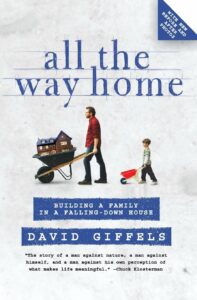 All the Way Home: Building a Family in a Falling-Down House David Giffels (Harper) $16.99 OUR SALE PRICE = $13.59
All the Way Home: Building a Family in a Falling-Down House David Giffels (Harper) $16.99 OUR SALE PRICE = $13.59
This is not recent, but I finally read it over this past summer and, wow. How had I not read this before?
I’m not much of a handy man. Okay, I’m not at all; Beth was raised in a hardware store so knows her way around a tool-box much better than I. We have a few friends who have rehabbed their broken-down homes, while living among demolished walls and bad wiring and buckets of spackle. I thought of them when I read this, perhaps one of my favorite books ever. I so, so enjoyed this and, to be honest, I wasn’t surprised.
You may recall that a few years ago I raved about another memoir by David Giffels called Furnishing Eternity: A Father, a Son, a Coffin, and a Measure of Life about how he and his eighty-some year old father teamed up to build a coffin for the elderly dad. It’s a wonderful read, tender and funny, set in Giffels’s beloved blue-collar, rust-belt town of Akron Ohio — about which he wrote wonderfully in another favorite book of mine, a collection of essays called The Hard Way on Purpose: Essays and Dispatches from the Rust Belt. (While we’re at it, I raved here about his book this past fall trekking his home state, searching for clues to what unites and divides us, what folks yearn for, and how the looming election might go down. We’re still recommending Barnstorming Ohio to Understand America. Put on that great old Simon & Garfunkle song and check it out. It’s a wonderful, good-hearted and helpful read.)
All the Way Home, though, is what catapulted Giffels to fame, and, if you didn’t catch it above, I think I’d name it as one of my all time favorite reads. The story of “building a family in a falling down house” is a masterpiece. The Los Angles Times called it, without enough oomph or passion in my opinion, “A truly wonderful book… full of heart and cheer, a soulful, funny tale.”
Yes, wonderful, absolutely so; yes, full of heart (and at times, pathos — surprisingly so.) Yes, a fair amount of good cheer; and, yes, it is really, really funny. It isn’t just a goofy or slap-stick “money pit” story, though (although the escapade with the critters in the attic is ridiculous!) but is also thoughtful, tender memoir, an artful story about place and home and family and history and hope.
There really are some good wood-working, tool-shop, rehabbing descriptions and carpenter types or those in the building trades will enjoy it. I know nothing about that world, but, man, I was right there — I’ve done enough hammering, at least, to mostly follow. (Although, ingenius as he is, part of his thing is wanting to figure it out himself and that means — he readily admits this — that he’s in over his head a lot, underestimating said projects (and how much it costs to do them.) His friends and wife are mostly long-suffering.
Giffels is a rock and roll fan and hip music critic, too, so there’s lots of references and allusions to bands and songs so my music fan friends (you know who you are) should read this. There are appropriate lines from good albums, including this, from The Replacements: “Look me in the eye, then tell me that I’m satisfied.”
In a way, that is part of what this story is about: what does it take to calm that restless heart, to find satisfaction. (And, yes, I’d say you could cue “I Can’t Get Me No/Satisfaction” by the Akron-based Devo right about there.)
All the Way Home with that signifcant sub-title, Building a Family in a Falling-Down House book is a delight, by a master of the creative nonfiction genre. It is a coming of age story for a young dad who, as he says in his previous book, enjoys “the hard way on purpose.” I can’t say enough about this great read and highly, highly recommend it. Especially if you’ve bought a house you had to fix up, or wanted to find just that perfect place that would be home. Who like upbeat and witty writing that can evoke the feels. All the feels.
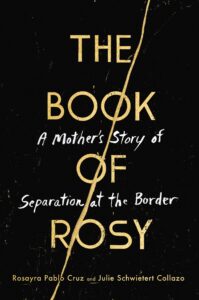 The Book of Rosy: A Mothers’s Story of Separation at the Border Rosayra Tablo Cruz & Julie Schwietert Collazo (HarperOne) $16.99 OUR SALE PRICE =$13.59
The Book of Rosy: A Mothers’s Story of Separation at the Border Rosayra Tablo Cruz & Julie Schwietert Collazo (HarperOne) $16.99 OUR SALE PRICE =$13.59
I have read several riveting memoirs of those who have been immigrants or those who have involved themselves in the lives of refugees and immigrants and asylum seekers. In previous BookNotes I’ve told you about the unforgettable Enrique’s Journey: The Story of a Boy’s Dangerous Odyssey to Reunite with His Mother by journalist Sonia Nazario and the Lancaster-based story by our friend, novelist Shawn Smucker, Once We Were Strangers: What Friendship with a Syrian Refugee Taught Me about Loving My Neighbor. I’ve mentioned often a book I’m even in, in passing, about Chinese asylum seekers (eventually detained for years near us in York County Prison) called The Snakehead: An Epic Tale of the Chinatown Underworld and the American Dream by the great nonfiction writer Patrick Radden Keefe. I do hope you recall our rave review of Separated by the Border: A Birth Mother, a Foster Mother, and a Migrant Child’s 3,000-Mile Journey published by IVP, written by Gena Thomas. It’s so moving, a very good idea for a book club. There are others, both journalistic reports and first-hand accounts and many of us would benefit from entering into this world, coming to know these issues — these people, for a bit. A memoir like The Book of Rosey can help.
This is a must-read for anyone wanting to “walk a mile in another’s shoes” as they say, learning empathy (at least) and most likely standing in awe at a mother’s love and determination. I found it very moving and, as Kirkus Review, said, “haunting and eloquent.”
Although a quick summary does not do this story which is full of pathos and care and compassion and human dignity, here is how the publisher explains the plot:
From a mother whose children were taken from her at the U.S. border by the American government in 2018 and another mother who helped reunite the family, a … story about the immigration odyssey, family separation and reunification, and the power of individuals to band together to overcome even the most cruel and unjust circumstances.”
I think it was this (one of many similar blurbs and endorsements) that convinced me to give this one a try, even though I’ve read plenty on this topic; this puts it well:
A must read. Gripping, beautiful, heartbreaking and life-affirming. This intimate tale of one woman’s journey across the border shines a light on the circumstances that have led thousands of women to risk all in order to give their children a safer, better life. It’s a testament to the compassion of strangers and that in these troubled times, storytelling still has the power to increase our empathy and understanding. Reading this book will change you for the better.”– J. Courtney Sullivan, New York Times bestselling author of Saints for All Occasions
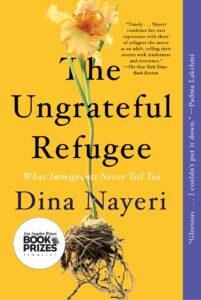 The Ungrateful Refugee: What Immigrants Never Tell You Dina Nayeri (Catapult) $16.95 OUR SALE PRICE = $13.56
The Ungrateful Refugee: What Immigrants Never Tell You Dina Nayeri (Catapult) $16.95 OUR SALE PRICE = $13.56
I have had this on my stack because Beth insists it is one of the best non-fiction books she has read this year. (She’s in the middle, now, of Playing Through the Whistle: Steel, Football, and an American Town about the steel-mill town of Aliquippa, PA, and their incredible fascination with hard-boiled high school football, which is a bit like her own high school alma mater of Steel High in Steelton, PA. It doesn’t quite fit the memoir category, but I promised her I’d mention it as it is nothing short of brilliant. But I digress.)
Nothing short of brilliant? That’s how she described The Ungrateful Refugee which has haunted her for weeks — the mark of a very good book.
We learned of Dina Nayeri’s honest and excellently-written memoir, I suppose, through her brother, Daniel Nayeri (author, most recently, of the most excellent YA novel Everything Sad Is Untrue: (A True Story) that is itself nearly a slightly fictionalized memoir of his own life, about escaping from religious repression in 1980s Iran and (making a very long story too short) ending up in the publishing industry in New York. As Dina tells her dramatic version of their escape and immigration experience as a serious literary memoir, first published in the UK, she explains the complications of their Christian family and their daring escape. And the complications of being a Persian immigrant, first in Europe and then in the US, and the process of gaining asylum. Whoa!
Ms Nayeri tells of the rather quotidian experiences in all of this and what it is like going through the rigorous journeys, then the proper channels and official processes and yet she also eloquently explores the deeper meaning of what it means to be an exile from one’s homeland.
Dina was born in Iran during the revolution there and arrived in the United States when she was ten years old. A graduate of Princeton, Harvard, and the Iowa Writer’s Workshop (wow!) She now lives in Paris. As a scholar of ideas (she is a Fellow of the Columbia Institute for Ideas and Imagination) she does explore common assumptions and misinformation about immigrants. The Observer said it is “a work of astonishing, insistent importance… full of revelatory truths…”
We think The Ungrateful Refugee is timely and insightful, entertaining and compelling — Beth couldn’t stop talking about it as she was reading a few months ago. The New York Times Book Review said her writing, especially as she tells of other refugees she has met, is full of “tenderness and reverence.”
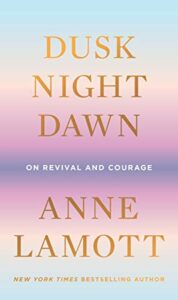 Dusk, Night, Dawn: On Revival and Courage Anne Lamott (Riverhead Books) $20.00 OUR SALE PRICE = $16.00
Dusk, Night, Dawn: On Revival and Courage Anne Lamott (Riverhead Books) $20.00 OUR SALE PRICE = $16.00
Those who know the storytelling ruminations and faith-based reflections of Anne Lamott know that she always roots her preaching of the gospel (which, after plenty of complaining, brings her good cheer) in all sorts of hardships in her own life stories. So this isn’t a memoir, exactly, not a linear, unfolding plot of her recent life. But each chapter adds a bit more color to her colorful life and a bit more faith to her life of ongoing conversion to the way of Jesus. They are sort of connected essays, storytelling from her own life, the ups and downs of these complicated days.
As she admits, “Yes, these are times of great illness and distress. Yet, the center may just hold.”
In a way, Dusk, Night, Dawn, is a bit of a follow up to her 2018 Almost Everything: Notes on Hope. I guess you can tell by the flow of the words on the title.
Agree or not with her hippy dippy worldview and her lefty politics and her penchant for appreciating non-Christian writers and gurus, her involvement in a small, urban PC(USA) church is sincere and her telling of teaching children Sunday school, as she has done for years, is lovely, even inspiring. And her ability to turn a phrase, work a metaphor, having fun with it, and then bring the whole essay home with a punch, is masterful. What a good nonfiction writer she is, in this style that seems “down home” and unpretentious, until you realize just how crafty and well-crafted the whole thing is. Dusk, Night, Dawn is breezy and fun as a conversation partner and a collection of fine, upbeat essays, but the prose is so well developed, the words so well-chosen it is worth it just to see how she does it.
I admire Mrs. Lamott and enjoy her, and her readers will feel that they know her a bit better after reading these connected essays. The first few, by the way, tell of her falling in love with a kindred spirit named Neal and marrying at what some might consider a surprising age. Well, nothing should surprise us about Anne Lamott! That Dusk, Night, Dawn is so good is not surprising, though — for her fans, it’s a must-have volume. For those who don’t know her, give this one a try. I trust it will make you think, and make you smile. The last short chapter, which she calls a “Coda” is entitled, simply, “Big Heart.” Yep.
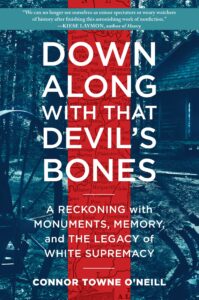 Down Along with That Devil’s Bones: A Reckoning with Monuments, Memory, and the Legacy of White Supremacy Connor Towne O’Neill (Algonquin Books) $26.95 OUR SALE PRICE = $21.56
Down Along with That Devil’s Bones: A Reckoning with Monuments, Memory, and the Legacy of White Supremacy Connor Towne O’Neill (Algonquin Books) $26.95 OUR SALE PRICE = $21.56
Once again, I have to say that this is truly one of the best books I have read all year. I couldn’t put it down. I do hope somebody out there sends us an order or two. It is unforgettable.
I must admit that I was thrilled when on the very first page he tells of kayaking near the Wrightsville Bridge that spans the Susquehanna River not far from us. The author grew up in Lancaster, PA, and although he now lives in Mississippi (where he teaches at Auburn University) he has roots around here. So when our town of York, PA, comes up in the story — in a story I find troubling — he knows exactly what the Southern racist is talking about; he’s from here! I love these kinds of connections to a book. And, believe me, this story spans so much territory, I’ll bet you’ll find something to relate to as well. Especially if you know anybody in the deep South, in Eastern Tennessee, or in Memphis, where key parts of the story unfold.
This is one of those creative nonfiction books that the author’s investigation of the topic is so vivid and narrated in real time that it feels very much like a memoir. Granted, this is not a full autobiography of Connor O’Neill — although he reveals plenty, from a early childhood in Philly at a mostly black school to his sussing out connections between his knowledge of the Civil War and the rise of Neo-Confederate statuary in key places throughout the south in the middle of the 20th century.
(We all know this now, don’t we? That monuments honoring those who fought for slavery in the so-called Civil War did not appear in some generic era wanting to honor the confederacy, but arose very suddenly after civil rights legislation was enacted in the late 1950s and into the heights of the civil rights movement in the early 1960s. These are monuments that had specific meanings and policy agendas when they planned, paid for, and celebrated in the context of their supporters vivid anti-civil rights efforts not general peans to southern culture.)
Connor Towne O’Neill wants to know more about all this and sets out to interview those who are supporters of major statues honoring the infamous Confederate general, Nathan Bedford Forrest. We learn right away that by far, the most honored person in the confederate monument biz is not Robert E. Lee, as we might expect, but Forrest. As O’Neill explains, Forrest was a bad, bad guy, who allowed on his watch a massacre of black prisoners and who after the war founded this little thing called the Klu Klux Klan. Although it seems he much later repented of this sinful stuff nearer the end of his life, those who celebrate him know he was the first and in many ways the most storied Grand Wizard of the KKK. These are the statues that are being debated (and are said to be a non-racist symbol of genteel Southern culture.) O’Neill’s book is the best I’ve read on this and it is a wild, even entertaining ride, or it would be if it weren’t so aggravating and the topic so grim.
Down Along with That Devil’s Bones tells of O’Neill’s journeys and conversations and coverage of statue debates in three locations where there are vigorous battles about the monuments. That he focuses on these three stories makes the book really focused and moving — he tells of his own travels to these towns, the local texture, his own observations and meetings, his own feelings and wonderments. He is self-aware about his own privilege and his own role as a historian. He is honest about his own past and shows us that this is not only a Southern story, but an American drama. As Publishers Weekly put it, “O’Neill writes with grace and genuine curiosity, allowing people on all sides of the issue to speak for themselves. As the copy on the book jacket says, it helps us see how we got from Appomattox to Charlottesville.
Join him as he takes us into the experience of being a Northerner transplanted, as they say, into the South — in Selma (in 2015 when his story begins.) Go, then, with him to Murfreesboro, on to Nashville, and then to Memphis. (Ahh, and there is an epilogue where he visits Montgomery, a riveting few pages so good I didn’t want the book to end.)
I appreciate that these kinds of books have been compelling for many and pray that this one, too, finds readers across the social and cultural spectrum and is taken to heart. It sure is interesting and it is written by an author who obvious has taken his own knowledge seriously, perhaps recognizing his own being, as my friend Steve Garber sometimes puts it, implicated. Perhaps many of us are. Perhaps it is true what Kiese Laymon (himself a black memoirist whose book Heavy I have reviewed in these pages) says about Down Along With That Devil’s Bones: “We can no longer see ourselves as minor spectators or weary watchers of history after finishing this astonishing work of nonfiction.”
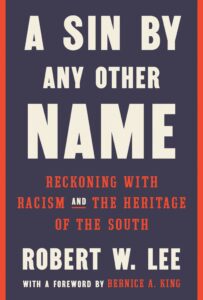 A Sin By Any Other Name: Reckoning with Racism and the Heritage of the South Robert W. Lee (Convergent) $25.00 OUR SALE PRICE = $20.00
A Sin By Any Other Name: Reckoning with Racism and the Heritage of the South Robert W. Lee (Convergent) $25.00 OUR SALE PRICE = $20.00
This is a small memoir, a story of the coming of age and the coming to the position of being an outspoken critic of statues of Robert E. Lee written by the great, great, great nephew of the Southern general. I wasn’t sure I needed to read it, and wasn’t sure it was substantive or well written enough. Why did I think it was just somehow capitalizing on his family’s namesake. Sure, I’m glad a relative of Lee came out against racism. But did he have to write a book about it?
Well, from the very first pages on, I was hooked and tore through this with joy and great intrigue. What a story. Again, I didn’t want it to end. It a great read. (And he is respected by many — the back has rave reviews and good blurbs by (get this) Rev. Dr. Bernice King, Diana Butler Bass, Whoopi Goldberg, and the great Jesuit author James Martin.) And, we come to know, Lee’s big moment was when we was asked to speak at a globally-televised MTV award show, standing with the grieving mother of the young woman killed during the riots at Charlottesville around the removal of the Lee statuary there. And that’s when the death threats began in earnest.
Man, what a story.
I won’t spoil too much, but some of this is a lovely tale of a young boys early sense of God, his involvement in his mostly white United Methodist church, how he got involved, in earnest but naive ways as a teen, in racial reconciliation projects in his high school, and how he discerned a call to Christian ministry. (He ended up going to Duke, by the way, so he’s one smart cookie, actually.)
Anyone who was a person of faith in high school and yearned to be clear about God’s presence and leading will get a kick out of this earnest telling. Come to think of it, I haven’t read much that covers this nice ground…
One episode is important, though, and it is a bit of a spoiler: a black woman was a secretary or helper to his mother at her workplace, the local hospital. After school, Robert would go there for a bit until his mother was off work and he would ride home with her. In those moments waiting for his mom to finish her workday, Robert became friends with this black woman and enjoyed knowing of her deep faith and active church involvement. When it came time tor Robert to find a sponsor for his own confirmation process at his own church, he asked Mrs. Bertha Hamilton to be his adult mentor. Of course she said yes, and he subsequently visited her own historical black church. More importantly, she visited his home and in his room saw his proudly displayed Confederate flag and Robert E. Lee memorabilia. Oh my. She had a heart to heart with young Robert and it was an early but profound, decisive episode. He learned that his own proud heritage was hurtful to this woman he admired and loved.
This was obviously an unusual and unforgettable confirmation experience that, again, got him on a certain track in his life. It makes for a unique story, and A Sin By Any Other Name is well worth reading.
It is interesting how, once in ministry, how Lee was treated in churches in the South that felt his outspoken position was a betrayal of so much they held dear. It was interesting how his fairly standard anti-racism messages were seen as so controversial even in mainline Protestant churches. The book has a few chapters about his first job as a young pastor, and that is instructive (and for some, will cause nods of appreciation.) His moment of fame at the MTV gig was narrated in such a way that I was really moved, wiping back tears as I read. (Have you ever been really honored and really nervous, having bought a new suit and feeling called to something but then fearful that it might backfire. Man, I’ve been there.) His journey to preach at Harvard was thrilling and his acceptance at the historic Ebenezer Baptism was beautiful. None of this comes across as bragging or namedropping; the dude was a young guy trying to be honest to his convictions, follow his call as a Christian, and next thing you know admittedly because of the spin of the story, relative of General Lee that he is) he’s famous, called upon to show up, put up, speak out, and he and his young wife are nearly in over their heads.
And you know what else? I loved this guy and his wife’s commitment to their small North Carolina town. This less dramatic part of the story was important, too, as he pushes for change but in gentle, caring ways, not as an outsider or antagonist, but as a member of the commonwealth there. I liked this guy a lot, and I think you’ll enjoy his great story of these few years.
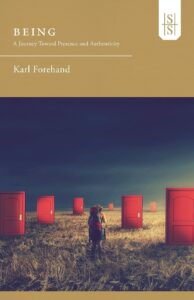 Being: A Journey Toward Presence and Authenticity Karl Forehand (Shai-Sophia House) $19.99 OUR SALE PRICE = $15.99
Being: A Journey Toward Presence and Authenticity Karl Forehand (Shai-Sophia House) $19.99 OUR SALE PRICE = $15.99
Some BookNotes readers might recall a short review I did of what I believe was Karl Forehand’s first book, a book called Apparent Faith: What Being a Father Taught Me About the Fathers Heart. It was a nice fatherhood memoir, a story of his own past, his relationship with his father, and his own extravagant love for his own children. If God is called a Father — or “Daddy” as Jesus prayed, using the Aramaic “Abba” — what might we discover about the character and heart of God by our own fatherly instinct. It wasn’t luminous or theologically heady, but it was a good story, with a sensible bit of insight, a trope we hear about sometimes but that, surprisingly, few have actually written about. He narrated his own life, told bits of his own story, and how it made him a more spiritually-tuned follower of the heavenly Father, now understood as more loving, kind, involved, and faithful than he ever before realized.
And then, a. year later, he wrote The Tea Shop another brief book, a glimpse into the life of the Forehand family, as he narrates the near disastrous vacation visiting a relative in Taiwan and a missionary friend in Taipei. As Thomas Jay Oord says, “The Tea Shop takes readers on a journey of discovery that makes a difference.”
Forehand, you see, is what some might call a recovering fundamentalist, a former Baptist preacher who has been renewed in his own faith by pondering his own interior life and the gracious doctrines of progressive faith. God is good. God is gracious. God is love. Radical, stuff, actually, when applied to one’s life.
And so, after a creatively written reflection/parable/story called The Tea Shop (which is half memoir, half fiction, half spiritual parable) Forehand has returned to straight-ahead memoir by telling about this recent era of his life in which he came to the liberating wisdom of the need for a deeper spiritual life. He, like many these days, is learning about doubt and deconstruction, about faith and hope, and about an inner sort of mystical encounter with the goodness of God that can be transforming, honest, real.
And honest he is. Karl tells about some horrible interactions with his wife and friends that pushed him to a crisis point. The book opens with this nearly jarring account of a couple of days of anguish and arguments although what he has learned later, he reads back into the story, realizing he was projecting a sense of his own insecurity upon his friends and beloved. He was bullied as a kid, he was traumatized, he was fearful. In mid life this was coming back to haunt him and he took it out on others.
This is sort of textbook stuff that I am sure counselors hear often. Forehand gets that, and tells the story without shame but as a way to show others how one can walk this path and learn these truths. In This, William Paul Young (the very creative mind who wrote The Shack, itself a story of grief and loss anguish and acceptance, grace and redemption) says, “This book is a tapestry of beautiful and authentic storytelling… tremendously helpful.”
As Forehand says,
It’s time to discover a new say of living and becoming where we remember that we are human beings not human doings. Embark on a powerful journey toward presence and authenticity, learning how to be where you are and who you are. Because, after all, “being” is not a destination — it is an ongoing and meaningful adventure.
And, as he also asks in one of the chapter sections — “Why Waste a Good Crisis?” And so, tells about “the weekend” and what he had to do to process his odd and hostile behavior. He had to “go deeper” with his self-critic and learn to be. To get there, he tells about learning from several sources about “the shadow” side and what it might mean to encounter this darker, secretive side of ones psyche. This narration of his own journey inward (and into his past) is clear and unassuming. He copes with his pain and the anxieties of being a “spiritual nomad” and shares what some might think are fairly conventional psychological cliches.
I think with a careful read, though, as commonplace as some of this is, you will not only enjoy (if that is the right word) reading about his guy’s life and journey and discoveries, but you will be inspired that somebody can come to grips with this fresh (and for some, self-evident) truth that we are invited into a relationship with a good God, and that that forms the basis for authentic and healthy relationships with others.. Why Forehand, a Baptist preacher, had to learn this the hard way — hadn’t he read Henri Nouwen or Ragamuffin Gospel or even Chuck Swindoll and Max Lucado? One doesn’t need to be a devotee of Thomas Merton or Ram Dass, for that matter, to have heard that we are to “be.” Yet, in Forehand’s life (and I wish he’d have explored this a bit more) something prevented him from breaking free with gospel liberation. As he journeys away from a performance-based religiosity and a deeper more simple sort of authentic faith that values “being” rather than “doing” readers are instructed, themselves, to be with their own deeper selves. In fact the last third of the book tells of how to “be” in all sorts of venues — with crisis, with community, with pain, with solitude, with nature, etc. He has chapter about his dog, and a good one about being with his own body.
Being is not going to win the Pulitzer Prize, even though Karl has dutifully worked diligently to offer an interesting and energetic book. And it isn’t breaking new ground theologically. But what it does is what so many of us so deeply yearn for: the author is a friend, a companion, a guide, even, just sharing a bit of what he has learned, even as we take his cue and process this transforming stuff in our own way and in our own lives.
And isn’t that one of the reasons we read memoirs, stories, testimonials? To realize we are not alone, to look over another ordinary person’s shoulder and follow along with their story.
I appreciate his bravery and vulnerability in Being: A Journey… There are two traits (with a nod to Brene Brown) that he calls us to. As Karl notes, the book describes nearly a 3-year time span, but “beneath that, almost 20 years of trying to understand how humans work and what God is like and how all that matters.” We wanted you to know about it.
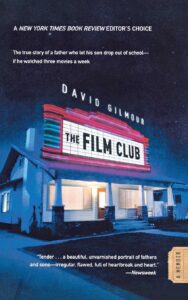 The Film Club: A Memoir David Gilmour (Twelves) $16.99 OUR SALE PRICE = $13.59
The Film Club: A Memoir David Gilmour (Twelves) $16.99 OUR SALE PRICE = $13.59
I was late to the game on this one; it was released to great acclaim in hardcover in 2008. It was chosen by the Chicago Tribune as one of the best memoirs of the year that year and a New York Times Book Review Editor’s Choice. The accolades were remarkable — “a delicate memoir”, “dynamic”, “ fascinating”, “heartwarming”, “a wry, wondrous memoir”, “subtly affecting.” I had to read it, hearing some of these and being intrigued by the basic plot: as it says on the cover, “The true story of a father who let his son drop out of school — if he watched three movies a week.”
I suppose I thought it would mostly be movie reviews and there was some of that, since that is, well, the heart of the story. But, oh my, there is so much more.
As Newsweek put it, The Film Club memoir is “Tender… a beautiful unvarnished portrait of fathers and sons — irregular, flawed, full of heartbreak and heart.” Yep.
The kid is sort of a punk, but the dad, living in Toronto who has worked as a film critic, says the 15-year old boy, Jesse, could drop out of high-school, if he agreed to watch and talk about three movies a week for a year. The father gets to choose — and what fun that was, the method in his madness. (There were themes, including “Over-rated films” and war and horror and the best movies of Jack Nicholson. It’s funny at times, touching, too, obviously a bit edgy. There’s lots of film lingo and it’s a nice way to read a memoir that is mostly about watching movies. But, of course, it is even more about parenting, about a less than ideal family and the insight that comes from this complicated year of learning about life from Hollywood’s greatest.
(Do I really. have to say, here in the thick of this long list of memoirs, that one doesn’t have to agree with the choices of the authors — and certainly not in this case. That isn’t the point; these are not morality tales. Geesh, I wouldn’t have picked some of those movies. Not to mention the little thing about letting his kid drop out of school. Okay? Just go with it.)
There’s plenty of other plot in the lives of the boy and the father, and you can discover that yourself. Wow. The heart of the story, though, are the movies (some which led to good discussions, many which do not.) There’s the expected showings (Citizen Kane, The Godfather, Crimes and Misdemeanors, films of Kurosawa, Kubrick, Bergman, and the like.) There are movies I hadn’t heard of, documentaries, some fairly raunchy, and a bit of goofy stuff. The kid got to pick some, too. Occasionally his on-again off-again girl friend joined them, but this mostly became a sacred time with father and son. The whole thing is pretty bittersweet by the end and I am really, really glad I read it. If only I had read it 25 years ago…
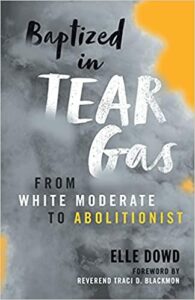 Baptized in Tear Gas: From White Moderate to Abolitionist Elle Dowd (Broadleaf) $16.99 OUR SALE PRICE = $13.59
Baptized in Tear Gas: From White Moderate to Abolitionist Elle Dowd (Broadleaf) $16.99 OUR SALE PRICE = $13.59
This is a memoir I was very eager to read, to be taken on a journey to the streets of Ferguson and I found some of it very, very moving. To see a fairly middle-class, conventionally attractive, smiling, earnest, young Lutheran pastor getting abused by cops in a BLM protest near Ferguson, is riveting stuff. As a fairly ordinary and wholesome kid, I found myself being tutored by radicals and those who seemed used to the near-violence at protests. Getting stomped on by police horses or being given hankies to protect from tear gas was shocking for this small town, conservative Christian kid. I can relate a tiny bit to Ms Dowd. Whether you can relate or not, or especially if you cannot, this is one heck of a story.
More, this is about her journey of realizing about her white privilege and learning about solidarity and suffering and the journey to deep mutuality, rather than churchy, do-gooder, paternalism. (She carries this work of reforming church life through SOUL in Chicago and #decolonizeLutheranism; she writes regularly for the Disrupt Worship Project and facilities workshops on gender, sexuality, and the church.)
During one of her first protests, all she could do was offer some water bottles and I can’t explain how deeply moved I was by this gesture, this position of wanting to help but feeling so unsure, so on the edge, not knowing how to help.
Some still may not know or believe it, but there really was brutal police violence aimed at often peaceful protestors in the season after the killing of Michael Brown. This first hand account confirms first hand testimony I have head and I know some of our readers will be shocked. For some, this is so far away from their own experiences, it may not mean much; for others, this is no big deal, or so they may think. But this carefully rendered story was deeply compelling for me and I am sure it will be for many readers who are open to learn what it was like. I am grateful for what Brenda Marie Davies calls a “transformative memoir.”
I will admit that not all of this was as page-turning as all this. She is learning the “great cost and greater reward” of moving towards being a mere ally and then to a fully engaged abolitionist. And for anyone who has spent any time on the political left, the rhetoric of this and insights gleaned could be tiresome. She warns against niceness if it covers up white supremacy; good insight. She tells about worrying if the protests will seem violent to her white suburban friend and asks who gets to define what is and isn’t violent; again, true enough. If these are fresh conversations for you, this is a great way into the discourse (as they sometimes call it) since it comes as a memoir of her own honest learning and growth.
Dowd is not arrogant about any of this but I suspect that some will think she’s a bit much. Or preaching the obvious, laden with lingo. I will be very eager to hear how those not familiar with this sort of stuff reacts to her book. She tells of a former friend who she even prayed with at church who unfriended her on Facebook — because Dowd renounced a gruesome, racist internet meme that this person re-tweeted. It is a small slight in the grand theme of things — different than getting tear-gassed — but it signified so much. I worried about that episode for days. I hope Hearts & Minds readers will be more generous and hang in there with her.
Baptized in Tear Gas is, admittedly, an edgy book. But she is a pastor and is herself hoping for conversation and rebirth; the memoir tells of her own transformation so she expects much from readers. There are theologically important discussion questions at the end of each chapter, so this would be good for an open-minded book club or adult ed class.) She covers a lot of ways that race and racism (not to mention sexism and homophobia) pervades our contemporary lives — she has two black children, both adopted from Tanzania, and even the complexities of that has to be explored. “I’ve made a lot of mistakes,” she admits, but she is fiercely loyal to her daughters. In deed, when non-activist, non-radical folks see people marching on TV or whatever, they often don’t consider that they’ve got spouses and children and parents, that they read books and play games and go to sporting events (and prayer meetings and lead worship.) It is remarkable seeing such a seemingly ordinary mom pushing into what she insists are Kingdom values, rooted in the Jesus way.
There is a bit of abstracted teaching —she name-drops Assata Shaku and quotes James Cone — but most is vivid memoir. Soon, you learn this: she is grabbed by police. It triggers her own previous sexual assault. This is plainly described and it will make your heart pound. Look: I know women who cannot dare to be in positions like this because it will indeed trigger evil episodes from their own lack of bodily autonomy. This isn’t just lefty sloganeering, it is real. It is awful stuff. Dowd tells about hiding in a basement with a few other Ferguson activists during a 4th of July weekend because the fireworks sound too much like tear-gas cannons. Her description of how this impacted her, hearing nearby fireworks is gut-wrenching.
She continues:
I want to be very clear about this because when we speak trivially about uprisings, we endanger people. This is not a game. There are real costs to this work, costs that I underestimated. I’m going to talk about some of the costs for me and my family because I want everyone to understand what activism is really like. But I want to reiterate: I was one of he most privileged people out there. I am a white woman. I had a job with a supportive boss. I had a family and friends who believed in what I was doing. I had access to healthcare. And still, my body and mind will forever be different. As you read about the ways this work has effected me, keep in mind at every juncture how much more deeply Black activists are affected.
So, it is her story, her hours on the streets and in jail and the courts. She learned what she learned and it will not be expressed in the same way you may wish. Some readers will be perplexed, others inspired. In any case, it’s a memoir of a new breed of pastor and street-level theologians, a devoutly Christian, exceedingly progressive faith leader. As her friend Rev. Traci D. Blackmon says in the foreword, after mentioning endearingly Elle Dowd’s youngest daughter and her own astute observations and joy, “This book is a road map to liberation for white people.” I suspect it is not the only road map we need, but, as another reviewer put it, “it is holy work.”
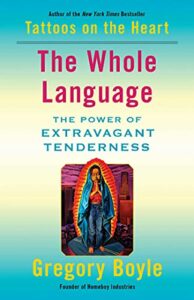 The Whole Language: The Power of Extravagant Tenderness Gregory Boyle (Avid Reader Press) $27.00 OUR SALE PRICE = $21.60
The Whole Language: The Power of Extravagant Tenderness Gregory Boyle (Avid Reader Press) $27.00 OUR SALE PRICE = $21.60
This new book just arrived and I’ve hardly dipped into it. But I can assure you that it will be as good and as beloved as his previous two best-sellers. I hope you’ve heard of Father Boyle’s inner city job training program, Homeboy Industries in Los Angles. Boyle is a Jesuit who’s faith-based, love-infused ministry is considered “the largest gang-intervention, rehabilitation, and reentry program in the world.” He has received the California Peace Prize, has been honored by the White House and by Notre Dame’s Laetare Medal. One reporter called him “The Gandhi of the Gangs.” As you might guess, all the net proceeds of The Whole Language goes to fund his extraordinary work.
His previous two books are Tattoos on the Heart and Barking to the Choir. I do not know of any customers who have read these and not loved them.They are consistent sellers for us, which tells you something: Boyle is not only a good writer and great storyteller, but he is one to something we long for: connection, kinship, compassion. He models courage and innovation, sure, but, more, he tells of kindness and — as he will put it in The Whole Language, perhaps with shades of the late Brennan Manning — “extravagant tenderness.”
Here is what it says on the inside cover:
Boyle’s moving stories challenge our ideas about God and about people, providing a window into a world filled with fellowship, compassion, and fewer barriers. Bursting with encouragement, humor, and hope. The Whole Language invites us to treat others — and ourselves — with acceptance and tenderness.
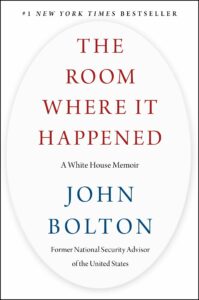 The Room Where It Happened John Bolton (Simon & Schuster) $32.50 OUR SALE PRICE = $26.00
The Room Where It Happened John Bolton (Simon & Schuster) $32.50 OUR SALE PRICE = $26.00
I devoured this memoir by one of the most important foreign policy leaders of our time, reading it late into the night at the end of the summer, amazed that I was learning so much about so much. As with other political memoirs and accounts of public service done by those who have served their country, there is much going on and it is hard to keep up. Although Mr. Bolton served as Donald Trump’s National Security Advisor for less than two years — 519 days, to be exact — his former service included significant positions in the White House administrations of Presidents Reagan, Bush #41 and Bush #42. For what it is worth, if you don’t know, I mostly opposed much of the foreign affairs of all of those Presidents and while I admire Mr. Bolton’s resolve and principle, I find myself on the other side of many, many issues, on nearly every continent, and nearly every war.
But that is why I so appreciated this book — I saw another very realistic side of the “hawk vs dove” debates and realized just how incredibly complicated every meeting is, how they must plan pre-meetings to discuss negotiations about who will or won’t talk to whom. A healthy and fair world order doesn’t come (obviously) from merely withdrawing troops or from merely putting your nation’s own interests first without qualification.
The Room Where It Happened is, among other things, a first hand glimpse into how so many momentous details go into nearly any governmental move, any step towards statesmanship. From the complexities of the relationships with North and South Korea, Japan and China, Taiwan and others in the Pacific rim, to the fraught relationships with Eastern European countries (and Russia), not to mention the dangerous relationships in the Middle East, Bolton could be arranging matters of huge consequence in meetings day after day, shuttling here and there, all the while not only negotiating with our allies and enemies, but with the differences of opinions between the State Department and the Pentagon and the White House. This is legendary stuff — just watch a couple episodes of Madam Secretary and quadruple that —and it is nothing short of breathtaking.
And this is completely beside the question of whether I, personally, trying to nurture the Christian mind and think theologically about political norms and principles, determining what just and prudent statecraft might be, would agree with Mr. Bolten on any given policy outcome or strategy to get there. I didn’t read The Room Where It Happened to shape my Christian political options, but as a memoir, an over-the-shoulder accounting of what it was like to shoulder this huge stuff. Anyone interested in “how the sausage is made” as Bismarck famously put it, will find this thrilling. Weird as it may sound, I really enjoyed it as a captivating thriller and first hand account of one guy in the thick of it.
And that doesn’t even take into consideration the real gonzo fly in the ointment, the unbelievable drama of having Donald Trump as Bolton’s boss. Which makes this incredibly informative, globe-spanning, detailed account of an international diplomat not only edge-of-your-seat interesting, but an absolute page-turning. hair-raising, fore-head-slapping, tailspin of a train wreck of story. If only it were a novel.
You just can’t make up stuff like this. For instance, say in one meeting Trump tells Bolton to insist on one thing to, oh, say, his Russian counter-part, or an attache to Turkey, or wherever. Later that day Trump tells a State Department guy the opposite. Bolton flies to Japan overnight to execute a certain agreed-upon strategy, he get there only to find out somebody else has violated strict chain of command protocols and has subverted the plan, offering a different agenda to the conversation partners across the table. Talk about blindsided, over and over. Further, the President loses his temper repeatedly, more, though, he just loses interest. He’ll ask the oddest questions of Bolton, indicating he doesn’t know the names of certain countries, let alone the Presidents of said countries let alone the binding treaties and laws in force. Bolton tries hard to stay true to his traditionalist ethics: he serves the President and signed on to do what the President says. But what does one do when the President is clueless about geopolitics, and spends hours of precious meeting time joking about the nicknames (“Rocketman”) he wants to give to his international counter-parts or ranting about suing somebody in ways that aren’t irrelevant and, on the face of it, ill-conceived? Billions of dollars, and, worse, thousands of lives are at stake in this war or that conflict; this is utterly consequential stuff. Trump is confused about basic facts and allows Bolton to tutor him on occasion, only then to turn on him and form alliances with other White House associates with other goals. It is surreal.
Some of us have read other books pulling back the curtain on the nearly unbelievable behavior in the administration of the last President. This one is not written by a liberal members of the mainstream media — read respected, serious journalists like Michael Wolff or Bob Woodward for that for that — but by a loyalist. It is his story, a political memoir by a seasoned GOP statesman.
By the way, in case you don’t know, there is this: interestingly, President Trump wanted to decrease American military escapades the world over. He didn’t want expensive, threatening military exercises in the Pacific; he didn’t want to be quite so bellicose against Russia, he was less dedicated to disrupting the shift to socialism in Venezuela than the militaristic Bolton. He complained incessantly, perhaps rightly, about NATO. Bolton was used to relatively orderly and principled administrations before him — normal leaders of a hawkish sort — but Trump was not only in constant disarray (and almost consistently dishonest with his colleagues) and often significantly ill-informed and fickle, but he was less confident in militaristic solutions than any of Bolton’s former bosses. This gives Bolton’s role an odd and curious weight, needing to make his case for more assertive effort to maintain (or expand) the American empire to a capitalist who sometimes sounded like an idealist peacenik. What a story!
Even as a peacenik, I oddly sympathized with Bolton as he represented real-politick and hard-nosed pragmatism in a whirl-wind administration that had no overarching principles or political theory or foreign affairs strategy. That is to say that I may, as a Christ-follower, disagree with Bolton’s ideology, but it seemed right to have some intellectually and historically and philosophically informed strategy rather than the ever-changing nonsense of Trump’s mood-of-the-day dictates. It was breath-takingly informative to see how Bolton navigated such complicated global situations, all the while perplexed by what the White House really wanted and how they would spin it to the press and what he should do, for the good of the Administration and, more, for the good of his country. There is no doubt that he is, at core, a patriot.
As is well known, the seasoned public official couldn’t take it any more, working incredibly long and stressful hours only to find himself betrayed and blindsided, over and over. That Trump would give authority for foreign affairs situations to Treasury Secretary Steven Mnuchin, for instance, violating Bolton’s commitment to “chain of command” and proper authority functioning just became too odd, too compromising, too pointless. The book ends — after almost 600 pages — as Mr. Bolton turns in his letter of resignation. And, surprising as it sounds, I wanted the book to keep going — we have been introduced to behind the scenes negotiations about all manner of things all over the world (again, like binge watching The West Wing or Madam Secretary but without the religion or family drama) and I truly wanted to know how things resolved (or unravelled, as the case may be.)
Bolton does compliment the former President on a number of things and summarizes what he think he accomplished, for the country and for the world. It was a good exercise for me to see this morally serious management of global crises through the eyes of a foreign affairs expert I had not particularly understood or respected.
To remind you: this book has been called “jaw dropping” and “a bombshell” and “jarring” and “astonishing.” It is a “devasting indictment” on Mr. Trump’s “vanity and incompetence.” But, in one more wacky aspect to this story, as you may recall, the former President oddly took the publisher and the author to court to try to stop publication (which, I suspect, helped fuel sales when it was released in June 2020.) Mr. Bolton, by the way, as is his law-and-order way, submitted the manuscript to classification experts, and was only required to excise a few phrases and dates. Mr. Trump’s accusations that this content was classified was ludicrous. This does make the book somewhat newsworthy to consider — or at least it did a year and a half ago. But now, I list it not as a jab in the Trump wars, nor whether I finally admire Mr. Bolton, but as a thrilling memoir, a story that reads like a political thriller and an existential struggle to know what to do, how to finally live with one’s self and one’s sense of calling. A novelist couldn’t have done a better job offering a hard-to-put down story of intrigue and conflict and hard, complicated decisions.
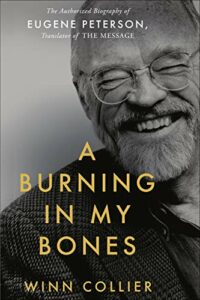 A Burning in My Bones: The Authorized Biography of Eugene Peterson by Winn Collier (Waterbrook) $28.00 OUR SALE PRICE = $22.40
A Burning in My Bones: The Authorized Biography of Eugene Peterson by Winn Collier (Waterbrook) $28.00 OUR SALE PRICE = $22.40
Might I indulge your already weary eyes and stretched pocketbook and say this: since we are talking about life stories, one of our most treasured books this year and one of our biggest sellers ever is not a memoir but it is a biography. It it written with verve, reads tenderly, and is full of the sorts of great insights one gets when one looks over the should at another well-lived life. It is a book about a pastor, a theologian, a Bible translator, a writer, a reader (and, yes, a customer of Hearts & Minds.) Yes, I am referring to this year’s remarkable, highly-appreciated, much-discussed authorized biography of the late Eugene Peterson. I wrote a bit about it before it came out (and took a lot of pre-orders.) Then we were honored to be mentioned as Peterson’s bookseller at the generous and fun on-line launch party, hosted by author Winn Collier and one of Eugene’s sons, the pastor and author Eric Peterson and took orders for even more. The book is simply stunning, one of the obvious choices for the best book of 2021. You’ll see it on this list. I hope it is fair to say you heard it here, first.
So, yes, buy some of these captivating new memoirs (or not so new ones as the case may be.) Enter into the mesmerizing world of evolving narrative and get lost in a book about the life of another human, made in God’s image in this messy world. But please don’t miss A Burning in My Bones. It is a great read, interesting, fun, full of glorious, imaginative sentences about a plain-spoken but remarkably imaginative man, an author you should know, a friend we will never forget.
PART TWO OF THIS LIST OF MEMOIRS COMING SOON
+++
It is very helpful if you would tell us how you prefer us to ship your orders.The weight and destination of your package varies but you can use this as a thumbnail, general guide.
There are generally two kinds of US Mail options, and, of course, UPS. If necessary, we can do overnight and other expedited methods, too.
- United States Postal Service has the option called “Media Mail” which is cheapest but slow and may be delayed. For one book, usually, it’s about $3.49.
- United States Postal Service has another option called “Priority Mail” which is about $7.60 or so for a few books and that gets much more attention than does “Media Mail.”
- UPS Ground is more reliable but about $8.00 or more for one or two books to most places.
– DON’T FORGET TO LET US KNOW WHAT SHIPPING METHOD YOU PREFER –
HELPFUL HINT: If you want US Mail, please say which sort — Media Mail or Priority Mail — so we know how to serve you best. If you say “regular” we left scratching our noggins.
BookNotes

SPECIAL
DISCOUNT
20% OFF
ALL BOOKS MENTIONED
+++
order here
this takes you to the secure Hearts & Minds order form page
just tell us what you want to order
inquire here
if you have questions or need more information
just ask us what you want to know
Hearts & Minds 234 East Main Street Dallastown PA 17313
read@heartsandmindsbooks.com
717-246-3333
We are still closed for in-store browsing due to our commitment to public health and the common good (not to mention the safety of our staff and customers.) The vaccination rate here in York County is sadly lower than average. Our store is a bit cramped without top-notch ventilation. We are doing fun, outdoor, backyard customer service, our famous curb-side delivery, and can show any number of items to you if you call us from our back parking lot. We are eager to serve and grateful for your patience as we all work to mitigate the ongoing pandemic.
Of course, we’re happy to ship books anywhere. Just tell us how you want them sent.
We are here 10:00 – 6:00 Monday – Saturday; closed on Sunday. Thanks for your support.
